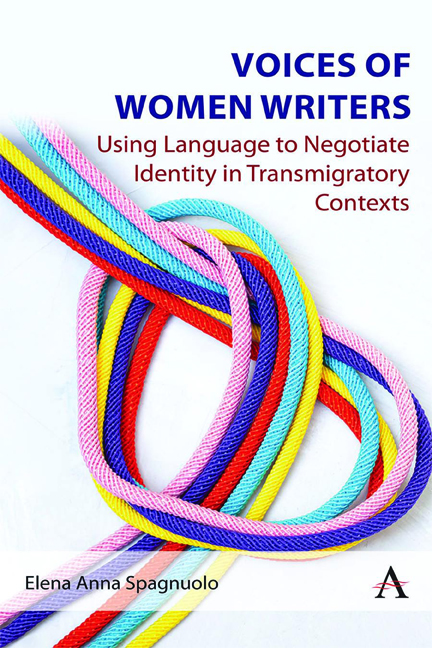Book contents
- Frontmatter
- Contents
- Introduction
- 1 Revoicing Female Migrant Identities through Creative Multilingualism
- 2 Gianna Patriarca: Self-Translating as a Strategy of Re-grounding
- 3 Dôre Michelut: Coming to Terms with the Mother Tongue
- 4 Licia Canton: Rewriting the Italian Mother (Tongue, Land)’s Legacy in Self-Translation
- 5 Francesca Duranti: ‘Trans-Writing’ the Self through Acts
- Conclusion
- References
1 - Revoicing Female Migrant Identities through Creative Multilingualism
Published online by Cambridge University Press: 01 March 2024
- Frontmatter
- Contents
- Introduction
- 1 Revoicing Female Migrant Identities through Creative Multilingualism
- 2 Gianna Patriarca: Self-Translating as a Strategy of Re-grounding
- 3 Dôre Michelut: Coming to Terms with the Mother Tongue
- 4 Licia Canton: Rewriting the Italian Mother (Tongue, Land)’s Legacy in Self-Translation
- 5 Francesca Duranti: ‘Trans-Writing’ the Self through Acts
- Conclusion
- References
Summary
Identity and Migration
In her book Beyond the Mother Tongue: The Postmonolingual Condition, Yasemin Yildiz introduces the notion of the monolingual paradigm (2012, 2).1 This paradigm establishes that people possess one language only: their mother tongue. The relationship with the mother tongue is believed to set the boundaries defining who we are. It links us to a well-defined and exclusive ethnicity and culture, affecting the way we operate and function within a specific community (2012, 2). This paradigm does not exist in nature; rather, it is a sociopolitical construct that emerged in the eighteenth century, and which reminds us that this world ‘is not one but is ruled as one’ (Ponzanesi and Merolla 2005, 6). As a matter of fact, the monolingual paradigm serves the purpose of organising our world, defining individuals and communities on both a personal and a collective level (Yildiz 2012, 2). Despite the attempts at imposing this paradigm on individuals and society, Yildiz claims that multilingual practices nonetheless continued to exist and survive. She defines them as postmonolingual, a term which describes their ‘struggle against the monolingual paradigm’ (Yildiz 2012, 4).
As mentioned in the Introduction, this struggle has become particularly evident in contemporary societies, where people are constantly on the move, crossing and inhabiting multiple linguistic, physical and cultural spaces. Their movements trigger a rethinking of the relation between individuals, place and language. Indeed, ‘traditional representations based on the supposed unity of people, culture and territory do not hold’ (Wilson 2020, 214). The alleged unity of people and language is also challenged. Constituting a movement to a different linguistic environment, migration breaks the constitutive relation between language and identity. It disrupts the grounding of the self in the mother tongue, forcing migrants to renegotiate and redefine their selfhood and rethink taken-for-granted concepts, such as home and belonging. For this reason, migrants have often been defined as ‘translated beings’ (Cronin 2006, Polezzi 2012). In order to function within the new community, the way they perceive and relate to reality has to be redefined and transferred from one linguistic and cultural dimension to another:
translation takes place both in the physical sense of movement or displacement and in the symbolic sense of the shift from one way of speaking, writing about and interpreting the world to another. (Cronin 2006, 45)
- Type
- Chapter
- Information
- Voices of Women WritersUsing Language to Negotiate Identity in (Trans)migratory Contexts, pp. 9 - 26Publisher: Anthem PressPrint publication year: 2023

